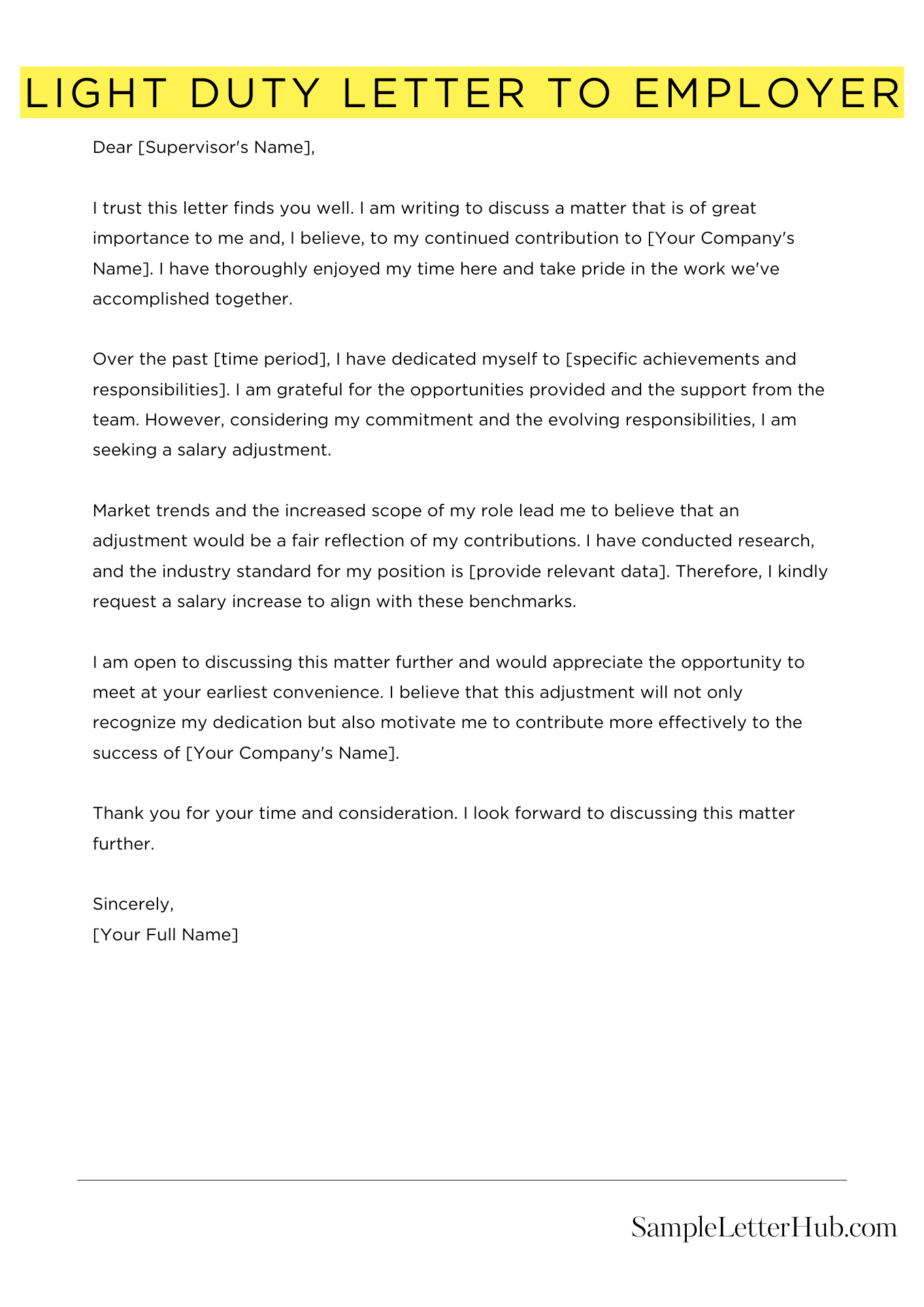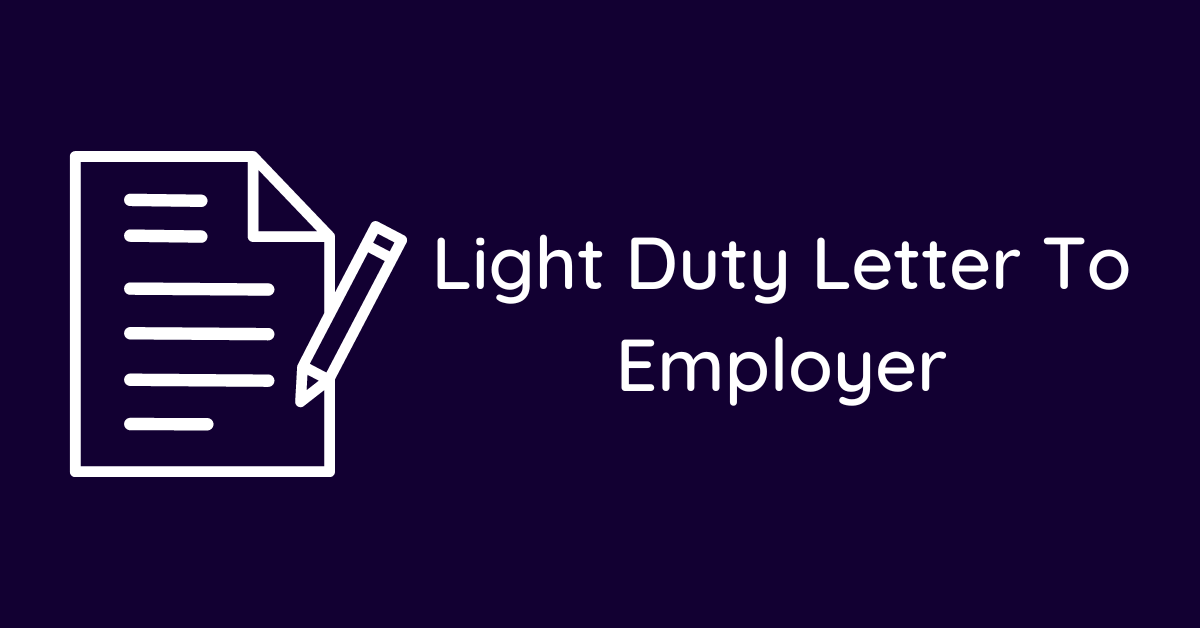A light duty letter to employer is a formal request to modify your work duties temporarily due to a medical condition or injury. It outlines your current limitations and the specific accommodations you need to continue working safely and effectively.
In this article, we’ll provide you with templates, examples, and samples of light duty letters to employer. These resources will guide you in drafting a clear and concise letter that effectively communicates your request. By using our samples, you can save time and ensure that your letter meets the necessary requirements.
Light Duty Letter to Employer
Dear [Employer’s Name],
I am writing to request a light duty assignment for the next [number] weeks due to a recent medical condition.
As you know, I have been experiencing [brief description of medical condition]. My doctor has advised me to limit my physical activities to avoid further injury.
I am confident that I can still perform my essential job duties with some modifications. I am able to [list of tasks that you can still perform]. I am also willing to take on additional responsibilities that do not require heavy lifting or strenuous activity.
I understand that my request may require some adjustments to my current work schedule or responsibilities. I am happy to discuss these arrangements with you and work together to find a solution that meets both our needs.
I am committed to returning to my full duties as soon as my medical condition allows. In the meantime, I will keep you updated on my progress and provide any necessary documentation.
Thank you for your understanding and support during this time.
Sincerely,
[Your Signature]

How to Write a Light Duty Letter to Employer
A light duty letter is a formal request to your employer asking for a temporary reduction in your work responsibilities due to a medical condition or other extenuating circumstances. It’s important to write a clear and concise letter that outlines your situation and provides supporting documentation.
1. Start with a Formal Salutation
Begin your letter with a formal salutation, such as “Dear [Employer’s Name].”
2. State Your Purpose
In the first paragraph, clearly state that you are writing to request a light duty assignment. Briefly explain your situation, such as a recent injury or illness.
3. Provide Medical Documentation
If you have a medical condition that necessitates light duty, include a copy of your doctor’s note or other supporting documentation. This will provide your employer with evidence of your need for reduced responsibilities.
4. Outline Your Proposed Accommodations
Clearly outline the specific accommodations you are requesting, such as a modified work schedule, reduced workload, or ergonomic modifications. Be specific and provide details about how these accommodations will help you perform your essential job functions.
5. State the Duration of Your Request
Indicate the duration of time you are requesting light duty. This could be a specific period, such as six weeks, or an indefinite period until your medical condition improves.
6. Express Your Willingness to Work
Reassure your employer that you are committed to fulfilling your job responsibilities to the best of your ability, despite your current limitations. Express your willingness to work with them to find a mutually acceptable solution.
7. Close with a Formal Closing
End your letter with a formal closing, such as “Sincerely,” followed by your typed name and signature.
FAQs about Light Duty Letter To Employer
What is a light duty letter to employer?
A light duty letter to employer is a document that outlines the restrictions and accommodations that an employee needs in order to return to work after an injury or illness. The letter is typically written by a doctor and provides the employer with information about the employee’s condition and how it affects their ability to perform their job duties.
When should I get a light duty letter?
You should get a light duty letter if you have been injured or become ill and are unable to perform your regular job duties. The letter will help your employer understand your restrictions and accommodations so that they can make arrangements for you to return to work in a safe and productive manner.
What information should I include in a light duty letter?
The light duty letter should include the following information:
- Your name and contact information
- Your employer’s name and contact information
- The date of the letter
- A brief description of your injury or illness
- A list of your restrictions and accommodations
- The date you expect to be able to return to full duty
How do I get a light duty letter?
You can get a light duty letter from your doctor. The doctor will assess your condition and determine what restrictions and accommodations you need. The doctor will then write a letter to your employer outlining your restrictions and accommodations.
What are the benefits of getting a light duty letter?
There are several benefits to getting a light duty letter, including:
- It allows you to return to work sooner than you would be able to if you were not on light duty.
- It helps your employer understand your restrictions and accommodations so that they can make arrangements for you to return to work in a safe and productive manner.
- It can help you avoid losing your job if you are unable to perform your regular job duties.

